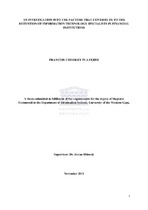| dc.description.abstract | Many financial organisations are working hard to design a skills management strategy that reflects the overarching national skills need for an institution, in the process of attracting highly skilled Information Technology (IT) specialists. But there are many organisations that are less concerned about mobility across nations and more concerned about the need to retain highly skilled IT staff. The pace and ubiquity of the information technologies’ (IT) progress means that organisations need to improve on their technologies, and so the skills needed to operate and utilise these technologies. The need for a highly IT skilled workforce is rising and, therefore, organisations will have to move beyond their traditional policies and practices to retain highly skilled IT staff.Organisations are employing and utilising various models, frameworks and strategies to nurture and address the retention of skilled IT staff. Even though these methods are well implemented and coordinated within organisations, skilled IT staff still leave organisations and minimises the level of retaining skilled IT staff. This is a functional shortfall at a management level, since a coherent lack to monitor the impact of external factors on retention strategies are overlooked. The same holds for the financial sector in South Africa. Therefore the aim of this research was to propose effective retention strategies for employers within the financial environment, to retain their skilled IT workforce.
In order to fulfil the objectives of this study, the literature review had been performed followed by the empirical field research. The field data were gathered by using twofold data collection technique: disseminating a questionnaire and interviewing participants in this study. The fieldwork followed the University of the Western Cape guidelines on research ethics.The outcomes of the study showed that there is a strong correlation between having good HR retention policies and procedures, and the management of these policies and procedures. The findings suggested the importance of involving employees at all employment levels to
provide input on the development of these policies and procedures so that the retention process is well understood across the firm Apart from contributing to the existing academic knowledge area, the study outcomes can beneficially contribute to organisations’ advantage and ability to retain skilled IT staff on a long-term basis.From a financial services sector perspective, this study will possibly contribute to the existing body of knowledge in the field of Staff Retention especially the area of Information Technology. | en_US |

